Big Oil Under Fire in Puerto Rico
Air Date: Week of January 27, 2023
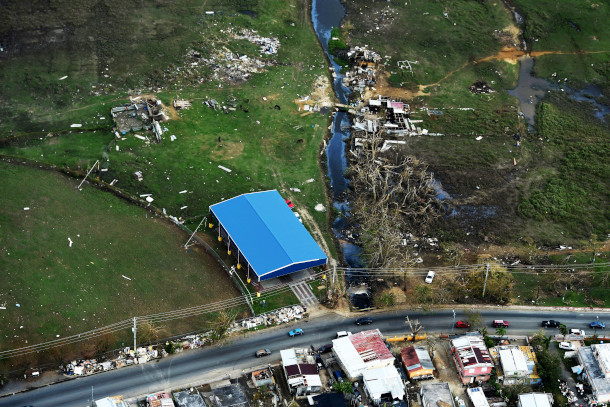
Hurricanes Irma and Maria caused billions of dollars in damage to Puerto Rico. Puerto Rico's government estimated it would need $132 billion from 2018 through 2028 to repair and replace the infrastructure damaged by the hurricanes. (Photo: US Department of Agriculture, Flickr, Public Domain)
Sixteen municipalities in Puerto Rico sue big fossil fuel companies for damages from Hurricanes Irma and Maria. The communities allege the fossil fuel companies learned their products would change the climate and intensify storms and then colluded to lie about it to the public. A win for the plaintiffs would be historic. LOE's Steve Curwood spoke with Melissa Sims, Senior Counsel with the Plaintiff's law firm Milberg.
Transcript
CURWOOD: From PRX and the Jennifer and Ted Stanley Studios at the University of Massachusetts Boston, this is Living on Earth. I’m Steve Curwood.
When the Category Five Hurricanes Maria and Irma smashed through Puerto Rico in 2017, they left in their wake some one hundred billion dollars in damages and thousands of people dead. Today a group of small cities and towns in Puerto Rico are suing the biggest fossil fuel companies for damages, alleging climate change linked to the burning of the fossil fuels they sold supercharged those hurricanes. The plaintiffs allege the fossil fuel companies knew for decades that their products would change the climate but colluded together in a disinformation campaign to deny that fact as they kept selling oil, coal, and plastic to a deceived public. The class action complaint claims that the companies including Exxon, Chevron and Shell engaged in consumer fraud, anti-trust violations and racketeering in civil violation of the Racketeer Influenced And Corrupt Organizations statutes known as RICO. It’s a civil action as only prosecutors can bring criminal RICO charges. This case is called Municipality of Bayamón et. al versus Exxon Mobil Corp. et. al and was filed in November in federal court in Puerto Rico. Other jurisdictions have sued fossil fuel companies over climate change, but the RICO, consumer fraud and anti-trust aspects of this action against multi-national oil majors are unusual and if successful would be historic. Joining us now is Melissa Sims, Senior counsel with the law firm Milberg, representing the plaintiff cities and towns. Welcome to Living on Earth Melissa!
SIMS: Hey, welcome. Thank you.
CURWOOD: So, let's talk about the various parts of this action. Your complaint says consumer fraud. What are you alleging there?
SIMS: So, as alleged in the complaint that the defendants, in order to sell their consumer products, withheld information from the public that they knew was untrue. They had particularized internal information dating back longer than I've been alive, I'm 54 years old, saying what we all know is now true. So Exxon had an intern in 1978, that predicted with particularity what is exactly happening in this world today, and his name was Steve Knisely. And during his summer internship, he put together a memo which is now being released. And it really is the original memo that base the 1980s documents from Exxon as to what we're going to do with this fossil fuel problem. They talked about how they had a greenhouse problem. And this intern in 1978-1979, put together a memo and a chart that is so eerily accurate of what is exactly happening in today's world. It has on one line of the axis the year, on one line the carbon in the atmosphere, and on the other line, how much the world was going to warm. And this intern in 1978, predicted what was going to happen today, tomorrow, in the future. Instead of taking that knowledge and doing the right thing. They used that knowledge and they concealed it. They colluded with one another in violation of federal racketeering laws. And they elected to embark on a deceptive campaign to change public opinion. And you can't do that, when you are selling a consumer product and you have internal information and then you pay for someone else to say something that you know, is untrue, that violates federal law. And when you do that you are embarking on a consumer deceptive campaign. And that's something that our law firm has done for years is sue companies for concealing information, propping up other experts and trying to say to the public something that they know is not true.
CURWOOD: Now why are you bringing this action with the allegations of racketeering? It sounds like you know, mob bosses in the mafia.
SIMS: So when you have a racketeering case all it needs to allege is that you have an enterprise and that enterprise consists of more than one person outside its own entity. So it could be two corporations, it could be two individuals, but it's someone outside itself, it's not a subsidiary, it's not someone who is an affiliate. It is two separate parties that get together to promote a scheme. And that scheme has to have at least two predicate offenses. And those predicate offenses are listed under the federal racketeering statute. And they include murder, robbery, all those, you know, things that you're talking about there, the mob boss type of allegations, but they also include wire fraud and mail fraud. And really this type of case plaintiffs do this, our firm does this quite frequently is file racketeering cases against several defendants who are coordinating with one another to perpetuate a fraud by using the internet or the mail. Anytime you send something over the internet, that is not true in perpetuation of that scheme, that is a predicate offense. So in order to make the claim for racketeering, you just need to show as a plaintiff that on more than one occasion, in the last 10 years that the defendants participated in a predicate offense in furtherance of the enterprise and that is what is alleged in the complaint.
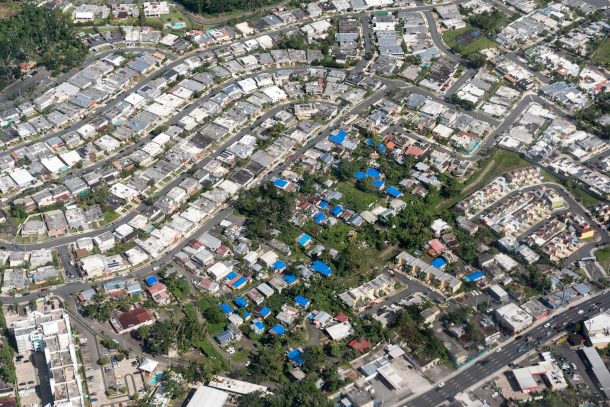
Blue tarps cover damaged roofs in San Juan, Puerto Rico seen from above after Hurricane Maria. Blue tarps provided by the U.S. Army Corps of Engineers provide a temporary covering of blue plastic sheeting to help reduce further damage to property until permanent repairs can be made. (Photo: Lorie Shaull, Flickr, CC BY 2.0)
CURWOOD: So talk to me about how Puerto Rico is vulnerable to climate change, or the evidence of Puerto Rico is so vulnerable to climate change, that you allege these companies promoted.
SIMS: So, generally speaking, without talking about strategy of the complaint, but generally speaking, Puerto Rico is the most affected by climate change in the world. I think it was, you know, had that dubious distinction a few years ago. And the reason why is not only is it precariously positioned as an eggshell plaintiff as alleged in our complaint, when hurricanes come through, they come through a very narrow band of the Atlantic Ocean. And that comes from the Sahara Desert, from the winds, that is, you know, scientific on how these hurricanes come to be. So, as they're making their way through the Caribbean, they are like spinning tops, there's 4,000 tropical storms, more than 4,000 tropical storms every year in the Atlantic Ocean. What makes one hurricane, what makes one fizzle out and die? We've all been to the Caribbean, we've seen storms come and go, you know, in a matter of 10 minutes, you just go up to your hotel room come back down, it's sunny again. But Puerto Rico is different, because it is precariously positioned right there in the hurricane center, in the hurricane zone, and the waters around Puerto Rico has warmed faster than any other water in the world. So when these spinning tops, when these tropical storms come through the Atlantic Ocean, and they bounce, if they come near that Puerto Rico warmer water, according to the scientist, Kerry Emanuel, who's quoted in our complaint, that is rocket fuel for a hurricane. So Puerto Rico doesn't have the luxury that we have in the mainland by sitting back and watching the guy wearing khakis on The Weather Channel talk about 'we're tracking this hurricane,' right? They don't have that luxury. They're at Ground Zero, they are at the frontlines of the hurricanes. And so they are living under constant state of fear as to when these monster hurricanes are going to come through, they don't have time to prepare. There is a disproportionate number of people in Puerto Rico who are handicapped, who are disabled, who do not have the means to leave and go somewhere else like we do in the mainland. But also with that monster hurricane fine comes the massive storm surge, and that's where the flooding comes in. In Puerto Rico, caskets rose and washed down rivers. So people of Puerto Rico had to watch caskets flowing down rivers. People were laying in their beds, and would drown because of the massive flash flooding. So Puerto Rico is not only just affected by that, but it's also affected by vectors, by mosquitoes, by Dengue fever, by Zika virus, and all of that as the climate gets warmer, and it has in Puerto Rico. As that climate gets warmer, the people of Puerto Rico are affected disproportionately than anyone else in the world.
CURWOOD: Why did the damages to Puerto Rico from Hurricane Irma and Maria fit within the provisions of the RICO statute?
SIMS: Well, the damages are directly related to their racketeering activities, as alleged in the complaint. So in order to prove a case, any case, not just this case, but any case, you have to show that the defendants conduct was a substantial factor in the plaintiffs damages. And of course, you can do a simple Google search. And you can read the scientific articles that we have alleged in our complaint to show that scientists now are showing that the rainfall itself related to the Hurricane Maria was five times to ten times more likely to be a cause because of climate change. The defendants are the major coal and fuel producers in the world. Actually, the Climate Accountability Institute actually did an analysis of the companies that are most responsible for climate change. The top 100 companies, and they have an actual percentage of each one and their contribution. So we know what each defendant has contributed towards climate change according to fossil fuels and the atmosphere. So these defendants as alleged in our complaint are 40.01% responsible for the carbon in the atmosphere, which directly affects Puerto Rico's damages.
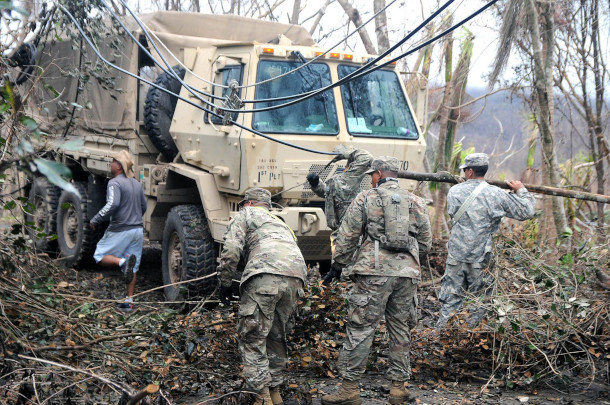
Citizen Soldiers of the 190th Engineer Battalion, 101st Troop Command, Puerto Rico Army National Guard, alongside residents of the municipality of Cayey, conduct a route clearing mission after the destruction left by Hurricane Maria through the region. Due to fallen trees, power lines and debris the several Puerto Rican communities were kept isolated for extended periods of time before clearing. (Photo: Sgt. Wilma Orozco Fanfan 113th MPAD, Puerto Rico Army National Guard, Flickr, CC BY 2.0)
CURWOOD: Now, scientists will say that any given storm may or may not be directly attributable to climate disruption, that you're looking at an overall trend, but a particular storm may or may not have been triggered by this. What's your response to that?
SIMS: The scientists in Puerto Rico have attributed the intensity of hurricane Maria to be caused by climate change. It's not the storm itself. It's the intensity. And the intensity has been directly related to climate change.
CURWOOD: Now you have done RICO cases involving consumer products in the past. Tell us a little bit about that.
SIMS: So our firm, Milberg, has been involved in numerous racketeering type conduct over the last 20 years. So recently with the opioid litigation, if you recall, where the opioid manufacturers and the distributors colluded together to flood the market with prescriptions, and so our firm was involved in that. And one of the allegations that was in the MDL was racketeering. There's been other numerous cases with our firm and with other of our sister firms that have filed. But there are also the omission cheat cases where some of the manufacturers auto manufacturers colluded with the manufacturers of the emission control devices, and decided to cheat the consumers into believing that their products met those standards. So our firm was also involved in that, but not just those cases, there has been a swell of racketeering cases over the last 15 or 20 years where plaintiffs have been successful getting past a motion to dismiss. And that's really the goal here is to get past a motion to dismiss to get into discovery and to find out more information that substantiates our claims because a lot of this information has been withheld from the public.
CURWOOD: Now, according to the complaint that you filed, this lawsuit, evidence of racketeering dates back to 1989 when the defendants formed the Global Climate Coalition. Tell me what is the Global Climate Coalition? And why are they included in this complaint?
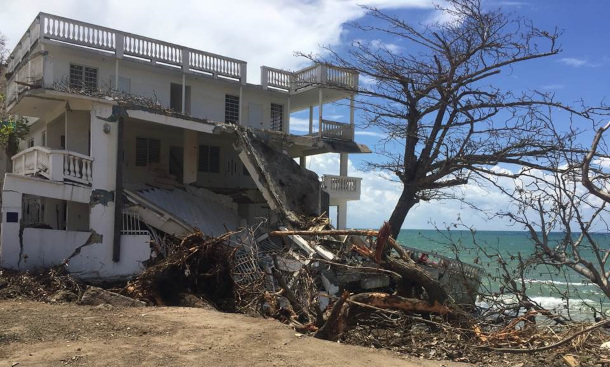
Home in Rincon Puerto Rico destroyed during hurricane Maria in 2017. (Photo: National Oceanic Atmospheric Administration, Wikimedia Commons, Fair Use)
SIMS: So generally speaking, just as alleged in the complaint without going deeper as more information that we're aware. But so what happened was the coal, not really the coal companies, but the oil companies had particularized internal documents, that they were fully aware that their products were causing a change to the atmosphere and would continue to do so. So in 1978, this intern, Steve Knisely has this memo that really sparked a lot of what happened in the 80s. So after Steve Knisely did this 1978-1979 memo, then other departments started extrapolating on that. And for a while it appeared that the oil companies were interested, you know, didn't really seem to take a position about what they were going to do about it. They were studying the problem, but they were fully aware of what was going to happen to our climate, that it was going to get hotter. The greenhouse effect has been, you know, coined since like the 1800s. So everyone kind of knew what greenhouse effect was. And so they were fully aware of that their products, the more we continued to use them in the atmosphere, that they would make the world warmer. So that was a really simple scientific concept. So, but then what happened was, they had to make the strategic decision whether they were going to invest in alternate energy, to tell the public what was going to happen if we continued to use those fossil fuel related products. But they chose the latter. And they chose to not tell the public what the truth was. And they colluded with one another. And they formed the Global Climate Coalition, which on its face, looks like a green company. You know, we call it greenwashing in the legal world, but it looks like it's for the environment, right? So really, what it was, was a very large group, thousands and thousands of members of companies that were fossil fuel dependent. And what they did is they worked together to promote their products. But at the core of it were the oil companies who were studying this issue. So in 1989, the Global Climate Coalition was formed. And it was really formed to stop the Kyoto Protocol, to stop anyone from regulating fossil fuel. And they were successful in doing that. Then they coordinated together in 1998 into a memo called the Victory memo. And in the Victory memo, that's really what it's called, the Victory memo. But they colluded with other parties who were actually part of the tobacco strategists. And they were charged with racketeering criminally and civilly by the Department of Justice. But so they colluded with the tobacco strategists to be like, how are we going to hide this information? And how are we going to change public opinion so that we could continue to sell our consumer products? And what's interesting about that is, in all the other racketeering cases that have been tried in the last 15-20 years, from a plaintiff, civil perspective, we haven't had anything in writing. And here we actually have a memo, we have a division of labor, among who was going to do what, what their goals were and how they were going to achieve them. So it appeared that the oil companies were studying, in earnest, a problem. They were actually fortifying their own equipment to ward against climate change, and at the same time telling the world that climate change wasn't real.
CURWOOD: So what are you asking for in this lawsuit?
SIMS: Well, the complaint asks for damages. And that's what a court is designed to do. A court is designed to reimburse a party for their loss. And that's what we intend to do, we intend to reimburse the municipalities of Puerto Rico for their loss for the 2017 Atlantic hurricane season, and Fiona.
CURWOOD: What about for consumers who purchased fossil fuels?
SIMS: Well, they should be reimbursed for their fraudulent purchases. That happens in all of our other consumer fraud cases, there's that if you purchase the product, and they, you know, deceptive, they were deceptive in telling you what the products were, and you know, their effects of it, then you as a consumer would be reimbursed.
CURWOOD: Based on your complaint, where you talk about the financial losses to the municipalities here, at least, how much money might we be talking about, if this action is successful?
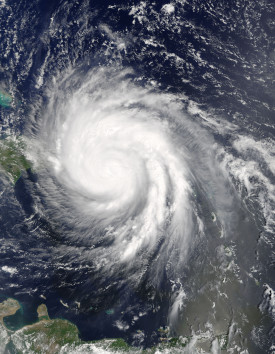
Deadly Hurricane Maria over Puerto Rico on September 20, 2017. (Photo: National Aeronautics and Space Administration, Wikimedia Commons, LANCE/EOSDIS, Public Domain)
SIMS: How much in terms of the losses to the municipalities? Oh, hundreds of millions of dollars and actual losses. I mean, their roads were washed away, their sidewalks were washed away. They spent overtime for all of their police officers, some of their police officers died. Some of their fire department equipment was lost. So the losses to these municipalities was astronomical, and they've really, you know, still not been able to replenish those losses.
CURWOOD: This kind of litigation as I understand it would, if you are successful, you could perhaps even get treble damages, three times the amount that was actually done.
SIMS: Yeah, for racketeering and antitrust, yes.
CURWOOD: So, let's say that you're able to demonstrate that these fossil fuel companies, in fact, conspired together to deny the dangers of climate disruption. What makes Puerto Rico special, here? I would say that people around the world, if that is true, have all been damaged by this behavior.
SIMS: Science. Science makes them better, because we have the science. The science has in the last few years, without a doubt. And we have a standard called 'Daubert', D-A-U-B-E-R-T, in federal court that we have to show and it is a consensus among scientists all over the world, that climate change has caused hurricanes to be bigger, hotter, wetter, stronger, faster, and Puerto Rico experienced that. And they experienced that to the point where, what 4000 people died? You know? So we have a duty, I believe, to show the world what happened in Puerto Rico. Not only what happened in Puerto Rico, but how Puerto Rico handled it, they are really a beacon for the rest of the world. I mean, we can turn to Puerto Rico and how they responded to Hurricane Maria. And I don't know if you've ever been to Puerto Rico, and I encourage everyone to go, they're the finest people on the face of the earth. But there were many communities without power for six months. Without power. These people were cleaning themselves with, in buckets. You know, they had no power to power their phones or have air conditioning, and they were washing their clothes in buckets. And yet they were still kind to each other. You know, and it really chokes me up thinking about the suffering that they had to deal with, but yet at the same time, they were helping each other out, and their story needs to be told.
CURWOOD: Melissa Simms is Senior Counsel at the law firm Milberg, thank you so much for taking the time with us today.
SIMS: And thank you.
CURWOOD: We reached out to each of the fossil fuel companies Melissa Sims mentioned in our interview. The only one that got back to us by our deadline was Shell. A spokesperson sent a statement that read in part “Addressing a challenge as big as climate change requires a truly collaborative society-wide approach. “We do not believe the courtroom is the right venue to address climate change, but that smart policy from government, supported by action from all business sectors, including ours, and from civil society, is the appropriate way to reach solutions and drive progress.” To read the full statement from Shell visit the Living on Earth website, LOE.org.
Links
EPA | “What Climate change Means to Puerto Rico”
Read the plaintiff’s complaint of Municipalities of Bayamón et.al. vs. Exxon Mobil Corp. et.al
Learn more about Plaintiff’s Attorney Melissa Sims
Reuters | “Puerto Rican Towns Sue Big Oil Under RICO Alleging Collusion on Climate Denial”
CleanTechnica | “Putting the RICO In Puerto Rico — Lawsuit Alleges Oil Companies Are Racketeers”
Living on Earth wants to hear from you!
Living on Earth
62 Calef Highway, Suite 212
Lee, NH 03861
Telephone: 617-287-4121
E-mail: comments@loe.org
Newsletter [Click here]
Donate to Living on Earth!
Living on Earth is an independent media program and relies entirely on contributions from listeners and institutions supporting public service. Please donate now to preserve an independent environmental voice.
NewsletterLiving on Earth offers a weekly delivery of the show's rundown to your mailbox. Sign up for our newsletter today!
 Sailors For The Sea: Be the change you want to sea.
Sailors For The Sea: Be the change you want to sea.
 The Grantham Foundation for the Protection of the Environment: Committed to protecting and improving the health of the global environment.
The Grantham Foundation for the Protection of the Environment: Committed to protecting and improving the health of the global environment.
 Contribute to Living on Earth and receive, as our gift to you, an archival print of one of Mark Seth Lender's extraordinary wildlife photographs. Follow the link to see Mark's current collection of photographs.
Contribute to Living on Earth and receive, as our gift to you, an archival print of one of Mark Seth Lender's extraordinary wildlife photographs. Follow the link to see Mark's current collection of photographs.
 Buy a signed copy of Mark Seth Lender's book Smeagull the Seagull & support Living on Earth
Buy a signed copy of Mark Seth Lender's book Smeagull the Seagull & support Living on Earth

